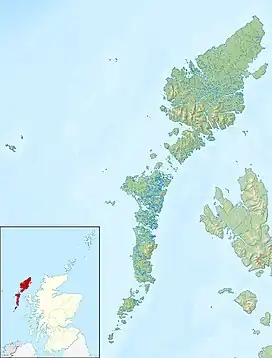| Scottish Gaelic name | Fraoch-eilean |
|---|---|
| Meaning of name | "heather island" |
| Location | |
 Fraoch-Eilean Fraoch-Eilean shown within Scotland | |
| OS grid reference | NF858581 |
| Coordinates | 57°30′N 7°15′W / 57.50°N 7.25°W |
| Physical geography | |
| Island group | Uists and Barra |
| Area | 55 ha[1] |
| Area rank | 189= [2] |
| Highest elevation | Cnoc Mòr, 11 m (36 ft)[3] |
| Administration | |
| Sovereign state | United Kingdom |
| Country | Scotland |
| Council area | Na h-Eileanan Siar |
| Demographics | |
| Population | No estimate available |
Fraoch-eilean is a small island with an uncertain population north of Benbecula in the Outer Hebrides of Scotland. It is about 55 hectares (140 acres) in extent and the highest point is 11 metres (36 ft). Its name derives from the Gaelic for "heather island".

It is connected to Grimsay by a causeway and there is a settlement called Seana Bhaile (Scottish Gaelic: old village). North Uist is to the north and the North Ford causeway to the west. The small islets of Eilean Roinoch and Màs Grimsay lie just offshore to the east. 19th and early 20th century Ordnance Survey maps show the island name as Seanabaily.[4]
Population
The island was not listed in either the 2001 census as being inhabited,[5] or in the 2011 census[6] although it is clear from both maps[3] and photographic evidence[7][8] that there is a resident population. The problems of defining islands in this part of the Hebrides are considerable[9] and it is likely that the population was recorded as being part of Grimsay itself, which has a population of 169 (in 2011). Thus, it has not been possible to provide either an estimate of the total or to rank the island relative to other Scottish islands.[10] Ordnance Survey maps indicate a total of about a dozen buildings[3] and a population in the range 10–35 is likely.
References
- Haswell-Smith, Hamish (2004). The Scottish Islands. Edinburgh: Canongate. ISBN 978-1-84195-454-7.
Footnotes
- ↑ Rick Livingstone’s Tables of the Islands of Scotland (pdf) Argyll Yacht Charters. Retrieved 12 Dec 2011.
- ↑ Area and population ranks: there are c. 300 islands over 20 ha in extent and 93 permanently inhabited islands were listed in the 2011 census.
- 1 2 3 "Get-a-Map". Ordnance Survey. Retrieved 21 August 2009.
- ↑ "Historical maps". Vision of Britain. Retrieved 18 Apr 2011.
- ↑ General Register Office for Scotland (28 November 2003) Scotland's Census 2001 – Occasional Paper No 10: Statistics for Inhabited Islands. Retrieved 26 February 2012.
- ↑ National Records of Scotland (15 August 2013). "Appendix 2: Population and households on Scotland's Inhabited Islands" (PDF). Statistical Bulletin: 2011 Census: First Results on Population and Household Estimates for Scotland Release 1C (Part Two) (PDF) (Report). SG/2013/126. Retrieved 14 August 2020.
- ↑ Fergusson, Dave (24 May 2007) "Houses on Seana Bhaile" Geograph. Retrieved 21 August 2009.
- ↑ Wilding, Stuart (20 June 2008) "Gearraidh Dubh" Geograph. Retrieved 21 August 2009.
- ↑ For example, Haswell-Smith (2004) treats Eileanan Iasgaich (grid reference NF785186) as a single island of 50 ha, although during some high tides it becomes several tidal islets - none of which are ever connected to the "mainland" of South Uist.
- ↑ In 2001 the General Register Office for Scotland defined an island as "a mass of land surrounded by water, separate from the Scottish mainland" and although the inclusion of islands linked by bridges etc. is not clear from this definition in practice they list several. There are however several smaller bridged islands that are likely to be inhabited from time to time they did not provide a population statistic for - see this list.